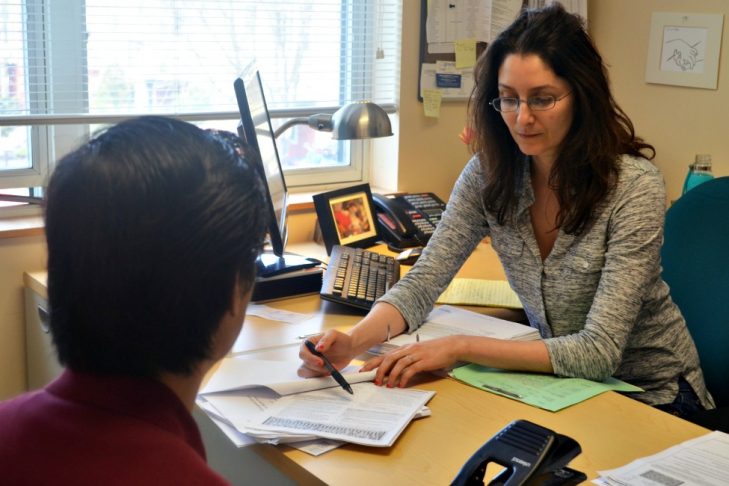CJP has partnered with Catholic Charities Archdiocese of Boston—a dedicated and impactful faith-based organization working to build a more just and compassionate society—to greatly expand direct, urgently needed legal assistance to immigrants through its Legal Aid Fund for Immigrants. Right now, Catholic Charities provides legal assistance for an estimated 1,000 people a year. This year, the need could easily quadruple.
We talked to Mariam Liberles about the importance of her work as the supervising attorney handling immigration cases at Catholic Charities.
Why did you become involved in immigration law?
I got involved in immigration because I’m an immigrant myself. I moved at 9 from Armenia to Los Angeles, and I experienced firsthand what it feels like to be an immigrant. I watched my family struggle to adjust to a new country. In law school, I interned at the Northwest Immigrant Rights Project’s asylum unit, and I fell in love with immigration law. After law school, I worked as an attorney at the International Institute of New England and later volunteered as an attorney at Greater Boston Legal Services in their immigration unit. Six years ago, I joined Catholic Charities. I’ve been practicing immigration law for almost 10 years.
You mentioned that your family came from Armenia. Can you describe the kinds of struggles immigrants face when coming to the United States?
You don’t speak the language. You don’t know the culture. If you are an adult and have a family, you need to find a way to support your family while facing these challenges. Understanding the culture and the people takes time. It takes time to feel comfortable in your own skin when you come to a new country.
What types of cases do you oversee?
The types of cases we handle include family-based immigration, in which U.S. citizens and lawful permanent residents—Green Card holders—can apply on behalf of certain family members; we help people apply for a Green Card, whether it’s helping them adjust their status in the United States or applying for visas abroad through consular processing; we help people apply for naturalization; we assist with Deferred Action for Childhood Arrival (DACA)—President Obama’s program for “Dreamers”; and we help with temporary protected status applications.
We also handle a variety of humanitarian-type cases, such as Violence Against Women Act self-petitions for survivors of domestic violence, U visas for victims of certain crimes who were helpful with the investigation or prosecution of the crime, and T visas for survivors of human trafficking. Additionally, we help children who were abused, neglected or abandoned by at least one parent to apply for special immigrant juvenile classification, and we handle some asylum cases as well.
What are some of your most memorable cases?
I helped a couple in removal proceedings to apply for non-lawful permanent resident cancellation of removal. They were eligible for this form of relief because they’d been in the United States for 10-plus years and had good moral character. We had to show that their U.S. citizen child would suffer exceptional and extremely unusual hardship if her parents were deported or if she had to leave with them, which is a very high standard to meet. She had a severe form of autism. I’m a parent as well; hearing the parents describe their struggles, I wanted more than anything to make sure the family would stay together in the United States, where she could get the treatment and special education she needed.
The judge granted cancellation of removal for the couple, and they were able to get their Green Cards. Five years after obtaining them, they’ll be eligible to apply for citizenship. It was an emotional case for me. I connected with the parents and knew how much they were struggling. They were such good people.
Recently, I worked on a provisional waiver case where I helped a young man from Mexico who had come to the United States in his early teens with his mother by crossing the border. He wasn’t eligible for DACA. His U.S. citizen father had filed a petition for him, but because he had crossed the border, he couldn’t apply for a Green Card in the United States. He would have needed to leave the country to apply for the visa and wait for 10 years to enter because he had accrued more than a year of unlawful presence in the United States after he had turned 18.
If someone can demonstrate extreme hardship to their U.S. citizen or lawful permanent resident spouse or parent, it’s possible to apply for a waiver so they would not need to wait 10 years outside the United States. The provisional waiver allows for a qualifying individual to apply for the waiver while in the United States. In our case, we tried to show that my client’s father would suffer extreme hardship. The provisional waiver was granted, and I prepared him for his visa interview abroad.
My client is now in his early 20s. He called me last week to let me know the visa interview went well and that his visa was approved. I worked really hard on the case and was glad to hear that everything turned out well. He was jumping for joy. It’s a wonderful feeling, and a reminder to me of why we do the work that we do.
Why is your work so important?
I think that now more than ever, people need to know their rights. If they’re eligible for relief, they should be able to apply for it. Many immigrants aren’t able to afford private attorneys, and the demand is so high. Thanks to our partnership with CJP, we can consult with and help more people. It’s so important. Our full-time attorneys handle more than 100 cases each at any given moment.
What are the benefits of U.S. citizenship?
In addition to being able to vote, there’s more security. With a Green Card, even though it’s lawful “permanent” status, if they pick up a certain crime, they could lose it. If they travel outside the United States and stay out for more than six months and come back, they can be deemed to have abandoned their Green Card. They could be placed in removal proceedings.
Citizenship also allows people to apply for more family members. As a U.S. citizen, you can apply for a sibling, which you can’t do with just a Green Card. Also, certain family members of U.S. citizens can get their visas faster. Plus, people feel so proud to become citizens.
CJP is proud to partner with Catholic Charities to help more immigrants find the dignity and safety they seek. The CJP Legal Aid Fund for Immigrants will increase the number of clients who can access the legal services Catholic Charities provides. Read more here.
This post has been contributed by a third party. The opinions, facts and any media content are presented solely by the author, and JewishBoston assumes no responsibility for them. Want to add your voice to the conversation? Publish your own post here. MORE














